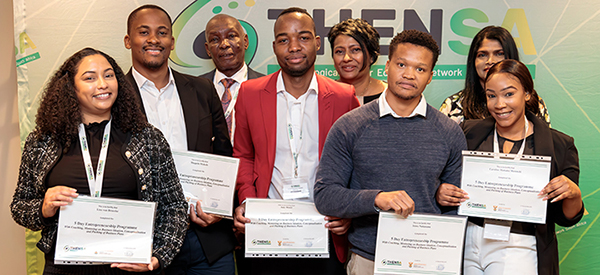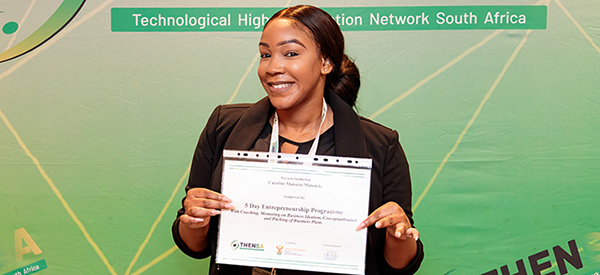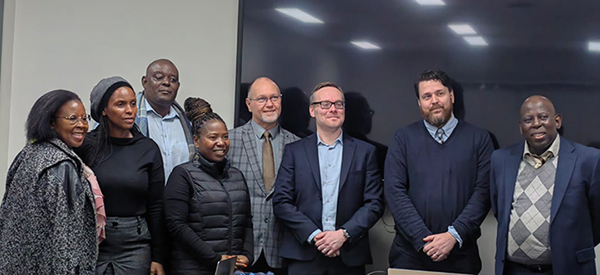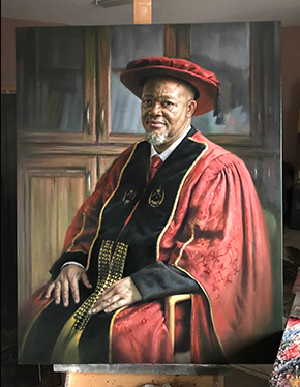Research
Unisa student innovators shine at an entrepreneurship training programme
Unisa student innovators participated in a five-day Entrepreneurship Training Programme organised by the Technological Higher Education Network South Africa (THENSA) and the Department of Science and Innovation (DSI) in Johannesburg.

Unisa student innovators who participated in the THENSA-DSI training programme
Together with a cohort of their peers from the University of the Witwatersrand, the University of Johannesburg and the Vaal University of Technology, their entrepreneurship skills and business plans were sharpened for the competitive business landscape. At the end of the programme, the student innovators pitched their business ideas to a panel of judges consisting of representatives from the Small Enterprise Finance Agency (SEFA), Small Enterprise Development Agency (SEDA), Industrial Development Corporation (IDC) and Access Bank.
The Department of Research, Innovation and Commercialisation's news desk spoke to three Unisa student innovators who have start-up businesses supported by the Directorate of Innovation, Technology Transfer and Commercialisation to share information about their start-up businesses and experience of the training workshop. This is what they had to say.
Agr-smart tech, producing innovative sensors for the agriculture industry
"With a focus on leveraging technology and automation to improve efficiency and sustainability, we design and manufacture cutting-edge equipment for farmers, agricultural businesses and food producers in South Africa," says Caroline Matenchi, the founder and CEO of Agr-smart tech. Agr-smart tech is an agricultural technology manufacturing company that specialises in producing innovative sensors for the agriculture industry.

Caroline Matenchi
Matenchi is a Bachelor of Science (BSc) in Life Sciences graduate at Unisa. "The BSc gave me a strong foundation in analytical thinking and problem-solving," she reflects. She also has a diverse background in science, customer technical support and entrepreneurship.
About her participation in the THENSA-DSI training programme, Matenchi says, "I had the opportunity to learn and redefine my product and my business processes. Most importantly, I enjoyed working with other students and thinking of ways one business can expand into various service development and delivery channels."
During the THENSA-DSI programme, Matenchi's Agr-smart tech was awarded the "Best Innovative and Creative Business Concept" award. She says the recognition has proven that as a lucrative business model, Agr-smart tech can implement and deliver to improve business processes and make it possible to expand the business.
Code Shandi's, an online community of African young professionals
"For the longest of time, Africa has been seen as a consumer and not a producer of technology," says Thapelo Godwin Mokole, founder and leader of Code Shandi's, an online community of young African professionals trying to change the landscape of the tech industry in our communities.

Thapelo Godwin Mokole
A young African professional himself, Mokole is a software engineer by trade with close to a decade of experience, currently working in the banking sector. His professional career spans a diverse range of sectors, such as academia, logistics, institutional investments, human resources and payroll.
He has a Master's degree in Computing (cum laude) and is currently pursuing his PhD in Computer Science at Unisa.
Through his start-up company, Code Shandi's, he aims to produce a community of professionals that are confident and well-equipped with the necessary skills to make Africa a great contributor to the tech scene.
"With this community," says Mokole, "we intended to incubate ideas and share knowledge with one another and facilitate the forging of relationships and connection."
Through the THENSA-DSI programme, Mokole says, he learned the essentials of running a successful business, such as booking, taxes, research and development, teamwork, selling and pitching.
He had the opportunity to meet and exchange ideas with other entrepreneurs who are currently operational or who are in the early stages of their businesses and formed relationships that will propel him to greater heights in his path.
As a highlight, Mokole had the privilege of sitting down with THENSA for a media interview, and he says, "As a natural introvert, such things are always daunting, but through courage and the willingness to want to become better one soldiers on."
"The experience was awesome as the interviewers covered a diverse range of questions. It was truly an honour to have been given the privilege to partake in the discussion. Above all, it was a good experience in that it afforded me the opportunity to articulate my thoughts clearly and express myself better."
LC Dynamics, improving access to cleaner energy
"I believe that having an easy-to-use backup power that can charge even during longer power outages, fits in seamlessly in the home and can be taken with when you move will be a game-changer."

Lisa Von Benecke
These are the words of Lisa Von Benecke, an entrepreneur who previously worked at a power station as an electrical maintenance technician. She is currently studying towards an Advanced Diploma in Power Engineering at Unisa.
In 2022, she founded LC Dynamics, with the aim to improve access to cleaner energy. "I noticed that while solar is becoming more popular and being adopted as a means for reliable backup power and affordable energy, tenants and sectional title properties often struggle to negotiate with landlords and body corporates to get these solutions installed."
This gave birth to her first product of developing a solar window blind that uses the sunlight passing through a window to power the most critical devices. "It can be non-invasively installed, easily cleaned, and when placed behind a window, it is kept safe from theft and weather damage," she said.
From a group of 24 teams hailing from Gauteng universities attending the THENSA-DSI programme, Von Benecke was recognised as one of the top three start-ups and received the "Highest Growth Potential Business" award. "This recognition was an honour and validation of my entrepreneurial journey. I believe that my company has the potential for growth and success, and I am grateful for the invaluable feedback and advice from some of the biggest funders and support entities for business and enterprises in South Africa."
* By Mpho Moloele, PR and Communications, Department of Research, Innovation and Commercialisation
Publish date: 2024/05/27

 Unisa co-hosts G20 community outreach in the Eastern Cape
Unisa co-hosts G20 community outreach in the Eastern Cape
 Unisans gain membership of prestigious science academies
Unisans gain membership of prestigious science academies
 Advocating for disability transformation through servant leadership
Advocating for disability transformation through servant leadership
 Unisa Press continues to illuminate the publishing space
Unisa Press continues to illuminate the publishing space